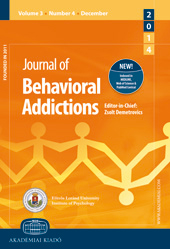Risk for exercise dependence, eating disorder pathology, alcohol use disorder and addictive behaviors among clients of fitness centers
Risk for exercise dependence, eating disorder pathology, alcohol use disorder and addictive behaviors among clients of fitness centers
Author(s): Astrid Müller, Sabine Loeber, Johanna Söchtig, Bert Theodor Te Wildt, Martina De ZwaanSubject(s): Cognitive Psychology, Behaviorism, Substance abuse and addiction, Health and medicine and law, Social Informatics, Sports Studies
Published by: Akadémiai Kiadó
Keywords: exercise dependence; eating disorder; pathological buying; pathological video gaming; hypersexual behavior; alcohol use disorder;
Summary/Abstract: Exercise dependence (EXD) is considered a behavioral addiction that is often associated with eating disorders. To date, only few studies examined the potential overlap between EXD and other addictive behaviors. Therefore, the present study aimed at investigating the relationship of EXD with pathological buying, pathological video gaming (offline and online), hypersexual behavior, and alcohol use disorder in a sample of clients of fitness centers. Methods: The following questionnaires were answered by 128 individuals (age M = 26.5, SD = 6.7 years; 71.7% men, 74.2% university students): Exercise Dependence Scale, Eating Disorder Examination-Questionnaire, Compulsive Buying Scale, Pathological Computer-Gaming Scale, Hypersexual Behavior Inventory, and Alcohol Use Disorders Identification Test (AUDIT). Results: 7.8% of the sample were at-risk for EXD, 10.9% reported eating disorder pathology, 2.3% pathological buying, 3.1% hypersexual behavior, and none of the participants suffered from pathological video gaming. The criteria for severe alcohol disorder pathology (AUDIT ≥ 16) were fulfilled by 10.2%. With regard to continuous symptom scores, EXD symptoms were positively correlated with both eating disorder pathology and pathological buying but not with pathological video gaming, hypersexuality or alcohol use disorder. It is noteworthy that more symptoms of pathological buying corresponded with more symptoms of hypersexual behavior. The correlation pattern did not differ by gender. Discussion: The co-occurrence of EXD, pathological buying and hypersexual behavior on a subclinical level or in the early stage of the disorders should be taken into account when assessing and treating patients. More research is warranted in order to investigate possible interactions between these conditions.
Journal: Journal of Behavioral Addictions
- Issue Year: 4/2015
- Issue No: 4
- Page Range: 273-280
- Page Count: 8
- Language: English

